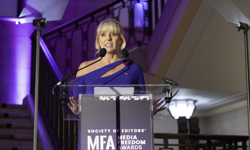
Ian’s winning piece — ‘A united Ireland might be convenient for some. But don’t we deserve something more exciting than convenience?’ — explores the prospect of a united Ireland and the Irish tricolour regaining its original meaning of hope for peace between Catholics and Protestants. The judges said it brought “a fresh perspective with original ideas” and “provided understanding around certain aspects that audiences may not have been familiar with”.
Ian’s article will be published in the Guardian’s opinion section. He will also shadow one of the Guardian’s political editors in the lobby and receive a cash prize of £500.
The award, run by The Guardian Foundation, is now in its fourth year and was created in memory of Hugo Young, a political columnist at the Guardian for almost 20 years and one of the most influential figures in British political journalism. Championing the best political opinion writing among students across the UK, the award celebrates Hugo’s legacy by encouraging fresh voices and new perspectives which, now more than ever, are essential to the future of quality, independent political journalism, says the Guardian.
The winner of the Hugo Young Award was revealed by Guardian editor-in-chief Katharine Viner as part of an online video announcement hosted by Sonia Sodha, chief leader writer at the Observer.
The shortlisted nominees were:
- Eleanor Magill from Goldsmiths, University of London: ‘The light in the fog of the adult social care crisis’
- Niamh Carroll from City University: ‘“Stop asking me about the Troubles.” Why English reductionism made me embarrassed to be from Northern Ireland’
- Barnaby Stone from Goldsmiths, University of London: ‘Why there is more to Devon than its “green and pleasant lands”’
Entries were judged blind by a panel of Guardian journalists against a criteria of finding the most topical, thoughtful and well-researched entries.
Ian Johnston, City University, winner of the Hugo Young award, said: "Ireland was partitioned almost a century ago and I have read lots of comment articles on how unity is more likely than ever. I have not seen anything written by people like me; moderate Protestants who could be won over to unification, but are worried about the uncertainty it could bring. I wanted to address the cultural and political ramifications of unification and am proud that my piece will be published in the Guardian, hopefully encouraging further debate and discussion around this topic.”
Sonia Sodha, chief leader writer at the Observer, said: “Ian’s winning article is an outstanding piece of journalism — it was beautifully written and offered an original and insightful perspective on a very timely issue. It was encouraging to read so many great articles; as a judging panel we were impressed by the quality and the range of subjects that writers focused on."
Young Hugo award
This year, a Young Hugo award was introduced for 16-18 year old students who attended a Guardian Education Centre workshop in the previous year. Entries were judged by a panel led by Anushka Asthana and the winning piece will be published on the Guardian Education Centre website.
Amy Rushton from Burnham Grammar School was announced as the winner of the first Young Hugo award for her article titled ‘Hypocrisy and big business: how difficult is it to go green in a modern world?’. The judges said the piece was “well evidenced, had a strong final argument and was very timely in the context of the global climate crisis”.
Highly commended were:
- Bethany Randell from King Alfred High School: The impossibility of the working mum
- Daphne Katz from City & Islington College: Nationalism: an avoidable evil
Kelly Walls, executive director, The Guardian Foundation, said: “This award is always a fantastic celebration of young journalistic talent and 2020 was no exception with the introduction of our Young Hugo prize. The Guardian Foundation always seeks to showcase, develop and support the next wave of aspiring young journalists.”
Last year’s Hugo Young award winner was Lucy Knight, who wrote a personal piece about her experience of being gay and Christian. Lucy has since had several pieces published by the Guardian and was interviewed about her article on daily news podcast, Today in Focus.












